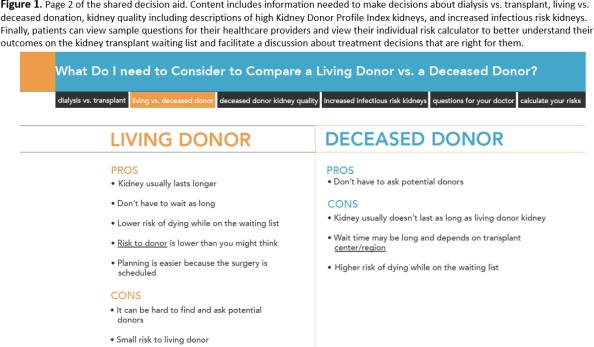Development of an Individualized Online Shared Decision Making Tool for Kidney Transplant Candidates
A. Hart,1,2,3 M. Bruin,1 S. Chu,1 M. Partin,1 A. Matas,1 C. John,1 A. Israni.1,2,3
1University of Minnesota, Minneapolis
2Scientific Registry of Transplant Recipients, Minneapolis
3Hennepin County Medical Center, Minneapolis.
Meeting: 2018 American Transplant Congress
Abstract number: 382
Keywords: Kidney transplantation, Outcome, Prognosis, Waiting lists
Session Information
Session Name: Concurrent Session: Psychosocial and Treatment Adherence
Session Type: Concurrent Session
Date: Monday, June 4, 2018
Session Time: 4:30pm-6:00pm
 Presentation Time: 5:18pm-5:30pm
Presentation Time: 5:18pm-5:30pm
Location: Room 3AB
Background: Inadequate knowledge hinders informed decision making in kidney transplant candidates. We conducted qualitative interviews and focus groups with patients and providers to inform development of an online shared decision aid that provides education about options and individualized estimates of likely outcomes on the kidney transplant waitlist.
Methods: In-depth interviews, focus groups, and one-on-one usability testing were conducted with 37 adult kidney transplant candidates in Minneapolis, in addition to 2 national focus groups of 13 transplant physicians and 4 national focus groups of 19 recipients between March 2016 and November 2017. Systematic inductive and deductive analyses of data were performed.
Results: 16 (43.2%) candidates were female and 14 (37.8%) were Black. 24 (64.9%) had at least some college education while 3 (8.1%) did not graduate from high school. Analyses of candidate and recipient interviews revealed desire for individualized information and honest discussions with physicians about outcomes. Patients had limited understanding of options and likely outcomes, demonstrating knowledge gaps about mortality on the waitlist, likelihood of transplant, differences between deceased and living donor organs, and deceased donor organ quality. Physicians represented 7 of the 11 OPTN regions. 7, or 53.8%, reported only sometimes discussing waitlist mortality with patients. Physicians described extensive transplant center approaches to educate patients, but still felt that patients do not understand outcomes on the waitlist.
Discussion: Data from stakeholders resulted in the iterative development of an online shared decision aid to guide provider-patient discussions about transplant vs. dialysis, living vs deceased donation, kidney quality, increased infectious risk organs, and individualized predictions of likely outcomes on the waiting list. Additional research is needed on whether the tool changes decisions, and how to implement decision aids into clinical practice. 
CITATION INFORMATION: Hart A., Bruin M., Chu S., Partin M., Matas A., John C., Israni A. Development of an Individualized Online Shared Decision Making Tool for Kidney Transplant Candidates Am J Transplant. 2017;17 (suppl 3).
To cite this abstract in AMA style:
Hart A, Bruin M, Chu S, Partin M, Matas A, John C, Israni A. Development of an Individualized Online Shared Decision Making Tool for Kidney Transplant Candidates [abstract]. https://atcmeetingabstracts.com/abstract/development-of-an-individualized-online-shared-decision-making-tool-for-kidney-transplant-candidates/. Accessed January 13, 2026.« Back to 2018 American Transplant Congress
